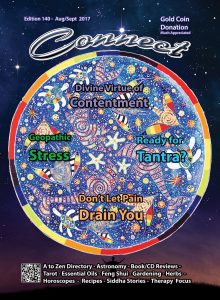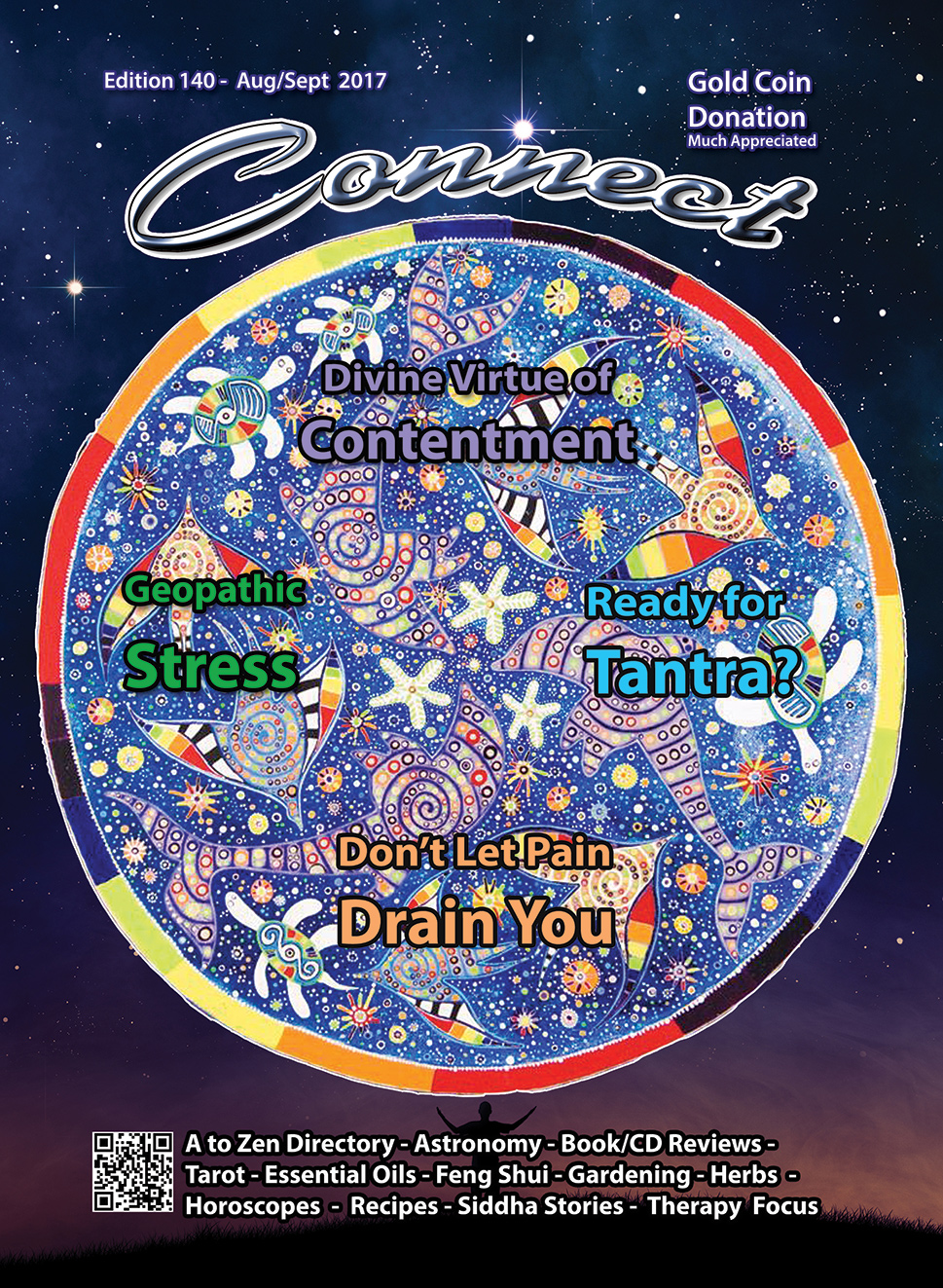 Cover Artist: Jeff Phillips-Wefferson
Cover Artist: Jeff Phillips-Wefferson
Cover Title: Rainbow Cetacean Dreaming Mandala
Medium: Acrylic – 2013
Contact:0474 858 882
http://www.dolphinmatrix.com/Jeff/
What Jeff is really about is creativity in harmony with a highest spiritual path. His mission as a crew member of Mothership Earth is not only to honour the beauty and power of nature, but to create awareness of the ways that humanity is destroying our planet through ways of ‘living’ that are incompatible with life and to re-navigate our overall process towards a more conscious and coherent reality in which lethal contradictions have been resolved, in which mitakuye oyasin, ‘all our relations’ can truly flourish.
Before commencing this article, I looked up ‘contentment quotes’ on the Internet. I was interested, even surprised, to discover that, while some people described contentment as something of great worth (‘I am content; that is a blessing greater than riches.’), for quite a few others it was not valued, and was even denigrated (‘One should either be sad or joyful. Contentment is a warm sty for eaters and sleepers.’). I was surprised by the negative descriptions, because for me contentment is a very desirable state; so I decided to investigate further, with the result, I hoped, of raising the standing of contentment.
A scale of ‘happiness states’
Contentment is one element in a range of states-of-mind-and-body that are all aspects of happiness. At one end of this ‘happiness scale’ we could list states that are accompanied by a great emotional ‘high’, such as bliss, ecstasy, elation, rapture etc. Though truly wonderful when we experience such happiness, these experiences aren’t sustainable over long periods, and the physical body can stay healthy for only so long under such circumstances: we can be so energised that we don’t sleep, can even forget to eat, or to carry out daily self-care and the routines and responsibilities that sustain our day-to-day lives. Because such a high level of enjoyment can’t be sustained long term, the highs can descend at times into frustration, disappointment and even depression.
Midway along the happiness scale would be enjoyment – definitely a happiness experience, but without such huge emotional highs. People who have found an occupation that gives them pleasure, whether it be for work, a hobby or a way of life, are able to maintain this state of happiness long term; some would describe themselves as fulfilling their passion through their occupation.
Finding contentment
Still on the happiness scale, contentment is at the other end from elation etc; it is a gentle state, without any major emotional fluctuations; its components include satisfaction, pleasure, even serenity, and we can live in contentment almost indefinitely once we discover how to find it. While we will differ in what brings us contentment, most people would probably relate to some of the following, as situations in which they would experience contentment:
- Sitting in companionable silence with a close friend or a loved one
- Or sitting in companionable silence with a purring cat
- Working on an enjoyable and engrossing task
- Completing some undertaking to the best of your ability, and then letting it rest; (some possible examples could be baking a loaf of bread; painting a room; getting a young child off to sleep at night; clearing out a cluttered shed or cupboard; finally finishing a work project).
- Just home after a long day – that first sip of tea or your favourite alcoholic drink
- The awareness that right now there’s nothing you need to do, and nowhere else you need to be
- Relaxing somewhere beautiful in nature, enjoying the atmosphere
- Considering with gratitude the blessings in your life
- Lying in a comfortable, warm bed on a cold night.
A really lovely example of contentment (preceded by quite a bit of elation) is the, ‘That’ll do, Pig’ moment, right at the end of the movie Babe. If you’re not familiar with this movie, or have forgotten the ending, you can find this by going to YouTube and searching at the top of the page for, ‘That’ll do pig Babe movie clip’.
People who depreciate contentment may have beliefs or values that are incompatible with contentment, for example: believing that contentment leads to lack of productivity; needing to always feel and be seen to be busy and industrious; valuing themselves and others for their achievements rather than their ‘beingness’; equating self-worth with a requirement to be perfect; viewing relaxation/contentment as laziness; constantly needing emotional ‘highs’.
Being contented doesn’t mean never achieving important goals, or never experiencing the excitement of elation or the ecstasy of bliss. We can rest on a foundation of contentment, from which we move out to undertake actions we are drawn to, then return to our secure base to recharge. In contentment, we are totally present – neither regretting the past nor wanting anything from the future; we are totally still – simply experiencing the moment. In this state of presence and stillness we can access our connection with higher aspects of our self, our creativity, and inner guidance. Some say that in contentment we connect with God, and Eckhart Tolle has said, ‘We should purify our innate well of contentment … and then external things will be in harmony with us’.
So contentment isn’t in any way an inferior state of happiness. In fact, as a method for connecting with the God within, and for achieving inner and outer harmony, we could regard contentment as the ultimate happiness – the happiness state in which we can have it all. So why settle for second best? Aim for contentment, and experience ‘blessings greater than riches’.
Annabel Muis
Annabel has worked as a social worker and human resource consultant, and is an experienced Reiki practitioner and Reiki teacher. Contact: 07 4093 8937; annabel.muis@gmail.com
References: 1. Henry Fielding
- Eugene O’Neill



